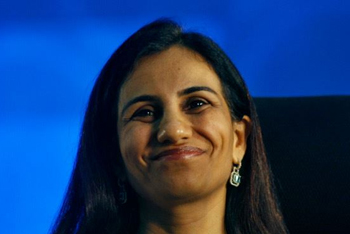New York, Sep 21: As many as eight Indian women, led by ICICI Bank chief Chanda Kochhar, have made it to the Fortune list of 25 most powerful women "shaping the new world order" in the Asia-Pacific region.

Mr Kochhar, placed highest among Indian women in the list, has been ranked second across the region, while three others - State Bank of India's Arundhati Bhattacharya (4th), HPCL's Nishi Vasudeva (5th) and Axis Bank's Shikha Sharma (10th) - have also made it to the top 10.
The list is topped by Australian banking major Westpac's chief Gail Kelly.
Other Indians on the top 25 list include Biocon chief Kiran Mazumdar-Shaw (19th), National Stock Exchange (NSE) CEO Chitra Ramkrishna (22nd), HSBC's Naina Lal Kidwai (23rd) and TAFE chairman and CEO Mallika Srinivasan (25th).
Releasing the latest rankings, the magazine said that women around the world are continuing to win the top jobs, so much so that more than a third of the women on this Asia-Pacific list are making their debut in the coveted list, including two from India.
The two Indian new entrants are Ms Bhattacharya and Ms Vasudeva.
"More and more businesswomen are taking tougher jobs and helming bigger firms. More than a third of the women on our Asia-Pacific list are making their MPW (most powerful women) debut," Fortune said.
Among Indians, SBI chairperson Adundhati Bhattacharya, ranked second after Mr Kochhar in the list, is the first woman to hold the three-year post at the country's largest bank and oversees a 208-year-old institution with $400 billion in assets and 218,000 employees dispersed among 16,000 branches across India.
On the other hand, Ms Vasudeva, 58, became the first woman to head an Indian oil company and is "and one of only four women to helm a Global Fortune 500 firm in the Asia-Pacific region".
Ms Ramakrishna is the only woman on the list heading a stock exchange.
Meanwhile, PepsiCo's India-born CEO, Indra Nooyi, has been ranked third among the world's most powerful business women by Fortune. She is only Indian-origin woman on this year's global list, which has been topped by IBM chairman and CEO Ginni Rometty and General Motors CEO Mary Barra.





Comments
Add new comment